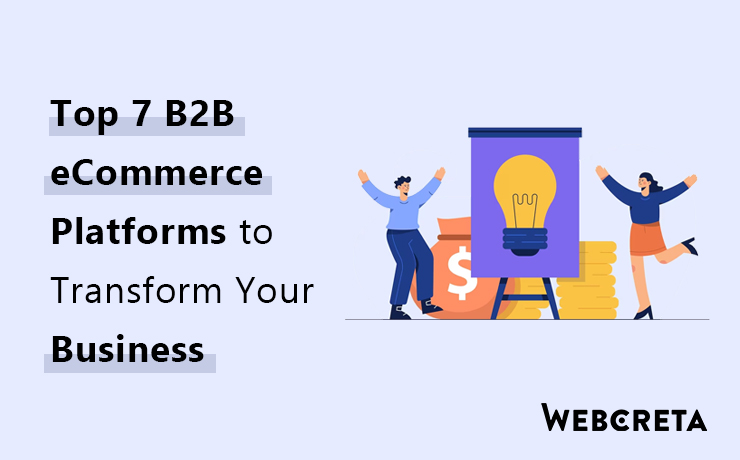The Top 7 B2B eCommerce Platforms to Transform Your Business

Table of Contents
B2B eCommerce platforms have become indispensable tools for businesses seeking to enhance their operations, drive growth, and deliver seamless customer experiences. With a wide range of options available, it’s important to identify the most suitable platform that aligns with your business goals and requirements. In this blog post, we’ll explore the top 7 B2B eCommerce platforms, evaluating their benefits, pros, and cons, and assigning a score out of 5. We’ll also consider the ideal business size for each platform. Let’s dive in!
What is B2B Commerce?
B2B commerce refers to the exchange of goods, services, or information between businesses rather than between businesses and individual consumers (B2C). Unlike B2C transactions that are typically focused on individual preferences and needs, B2B transactions involve larger quantities, longer sales cycles, and complex purchasing processes. B2B commerce encompasses a wide range of industries, including manufacturing, wholesale, distribution, and professional services.
1. Adobe Commerce (Magento)

Benefits
Highly customizable: Adobe Commerce (formerly Magento) offers extensive customization options, making it ideal for businesses with unique requirements.
Robust feature set: The platform provides advanced catalog management, pricing flexibility, and scalability to support businesses of all sizes.
Open-source community: The large Magento community ensures continuous support, bug fixes, and an extensive range of plugins and extensions.
Pros
Scalability: Adobe Commerce can handle large product catalogs and high transaction volumes, making it suitable for enterprise-level businesses.
Flexible pricing: The platform supports complex pricing structures, enabling businesses to implement personalized pricing strategies.
Omnichannel capabilities: Adobe Commerce allows seamless integration with various sales channels, including physical stores and marketplaces.
Cons
Technical expertise required: Implementing and managing Adobe Commerce may require technical expertise or the assistance of a developer.
Cost: The platform’s enterprise-level features come with a higher price tag, making it more suitable for mid-sized to large businesses.
Steeper learning curve: Mastering the platform may take time due to its complexity and extensive features.
Ideal business size
Mid-sized to large businesses require extensive customization and scalability.
2. Shopify

Benefits
Ease of use: Shopify offers a user-friendly interface, making it accessible for businesses without extensive technical knowledge.
Extensive app ecosystem: The platform boasts a vast selection of apps and integrations to enhance functionality and streamline operations.
Scalability and security: Shopify can accommodate businesses of all sizes while ensuring reliable hosting and secure transactions.
Pros
Quick setup: Shopify simplifies the store setup process, allowing businesses to start selling online quickly.
Cost-effective: The platform offers a range of pricing plans, making it suitable for small to mid-sized businesses with budget constraints.
24/7 customer support: Shopify provides round-the-clock customer support to assist businesses with any queries or technical issues.
Cons
Customization limitations: While Shopify allows for customization, there may be limitations on modifying certain aspects of the storefront.
Transaction fees: Depending on the pricing plan, businesses may incur additional transaction fees, impacting overall costs.
Advanced features require additional investment: Some advanced features may require the purchase of apps or add-ons, adding to the overall expense.
Ideal business size
Small to mid-sized businesses seeking an easy-to-use platform with a robust app ecosystem.
3. WooCommerce

Benefits
Integration with WordPress: WooCommerce seamlessly integrates with the popular WordPress content management system, leveraging its user-friendly interface and extensive community support.
Customizability: The platform offers a range of themes, plugins, and extensions, allowing businesses to create personalized online stores.
Pros
Cost-effective: WooCommerce is a free plugin, making it an affordable option for businesses with limited budgets.
Extensive community support: The large WooCommerce community provides access to forums, tutorials, and user-generated content.
Familiarity and ease of use: Businesses already using WordPress will find WooCommerce intuitive due to its familiarity and similar user experience.
Cons
Scalability limitations: WooCommerce may face challenges handling large product catalogs or high traffic volumes, making it less suitable for enterprise-level businesses.
Reliance on plugins: Businesses must carefully manage third-party plugins to avoid compatibility issues or potential security vulnerabilities.
Limited customer support: Support for WooCommerce is primarily community-driven, which may require additional effort to find solutions to specific issues.
Ideal business size
Small to mid-sized businesses already utilizing WordPress and seeking a cost-effective eCommerce solution.
4. BigCommerce

Benefits
Scalability: BigCommerce can accommodate businesses of all sizes, making it suitable for both small and enterprise-level businesses.
Comprehensive feature set: The platform offers advanced functionalities, including customer-specific catalogs, streamlined checkout processes, and multi-channel selling.
Pros
Built-in CMS capabilities: BigCommerce allows businesses to deliver personalized experiences across multiple channels, enhancing customer engagement.
Robust security and reliability: The platform provides secure hosting, reliable infrastructure, and ongoing updates to ensure smooth operations.
Integration options: BigCommerce seamlessly integrates with popular payment gateways, shipping providers, and third-party apps.
Cons
Limited design flexibility: Customizing the storefront’s appearance may require advanced coding skills or the assistance of a developer.
Advanced features may require higher pricing tiers: Some advanced features are only available in higher-priced plans, impacting overall costs.
Transaction fees: Depending on the chosen payment gateway, businesses may incur additional transaction fees.
Ideal business size
Small to enterprise-level businesses seeking a scalable platform with robust built-in features.
5. OpenCart

Benefits
User-friendly interface: OpenCart offers an intuitive and easy-to-use interface, making it accessible to businesses without extensive technical knowledge.
Cost-effective: OpenCart is an open-source platform, making it a budget-friendly option for businesses with limited resources.
Pros
Extensive customization options: OpenCart allows businesses to customize their online stores extensively, providing flexibility to match branding requirements.
Large extensions marketplace: The platform boasts a vast range of extensions and themes, enabling businesses to enhance functionality and design.
Cons
Limited scalability: OpenCart may face challenges when handling large product catalogs or high traffic volumes.
Relatively smaller community: Compared to some other platforms, OpenCart has a smaller community, resulting in potentially fewer support resources.
Ongoing maintenance and updates: Businesses using OpenCart may need to invest additional effort into managing updates, security patches, and compatibility issues.
Ideal business size
Small to mid-sized businesses seeking a cost-effective and user-friendly platform with customization capabilities.
6. Salesforce Commerce Cloud (formerly Demandware)

Benefits
Integration capabilities: Salesforce Commerce Cloud seamlessly integrates with Salesforce’s CRM and marketing tools, enabling personalized experiences.
AI-driven personalization: The platform utilizes AI to offer personalized product recommendations, enhancing customer engagement and conversions.
Pros
Scalability and security: Salesforce Commerce Cloud provides scalability and robust security measures suitable for enterprise-level businesses.
Unified data model: The platform offers a unified view of customer interactions across channels, facilitating streamlined operations.
Omnichannel capabilities: Salesforce Commerce Cloud enables businesses to deliver consistent experiences across multiple channels.
Cons
Complexity: Implementing and configuring Salesforce Commerce Cloud may require technical expertise and customization to match specific business requirements.
Cost: Salesforce Commerce Cloud is generally more expensive than other platforms, making it more suitable for mid-sized to large businesses.
Learning curve: Mastering the platform’s complexities may require training and support for employees to utilize its full potential.
Ideal business size
Mid-sized to large businesses seeking a comprehensive enterprise-level solution with advanced integration capabilities.
7. SuiteCommerce (NetSuite)

Benefits
Integration with NetSuite ERP: SuiteCommerce seamlessly integrates with NetSuite’s ERP system, providing a unified commerce solution for businesses.
Pros
Unified data and operations: SuiteCommerce offers real-time data synchronization with NetSuite, ensuring accurate inventory management and order processing.
Advanced customization options: The platform allows businesses to create unique and tailored experiences to match their specific requirements.
Scalability: SuiteCommerce can handle the demands of growing businesses, making it suitable for mid-sized and enterprise-level organizations.
Cons
Relatively smaller ecosystem: SuiteCommerce has a smaller ecosystem of themes, extensions, and integrations compared to other platforms.
Technical expertise required: Implementing and managing SuiteCommerce may require specialized knowledge or assistance from a developer.
Cost: The platform’s pricing may be higher due to its integration with the NetSuite ERP system, making it more suitable for mid-sized to enterprise-level businesses.
Ideal business size
Mid-sized to enterprise-level businesses seeking a unified commerce solution with seamless integration to NetSuite ERP.
Summary
Choosing the right B2B eCommerce platform is crucial for driving digital transformation and achieving business growth. Each of the top 7 platforms mentioned above offers unique benefits and features tailored to different business requirements. Consider your specific needs, scalability, customization, technical expertise, and budget before making a decision. By leveraging these B2B eCommerce platforms, you can streamline operations, enhance customer experiences, and unlock new growth opportunities for your business.
Webcreta offers comprehensive B2B E-commerce Website Development Services tailored to meet your specific needs. You can hire E-commerce developers for your on-site or offshore development projects to unlock the full potential of your e-commerce Business.



